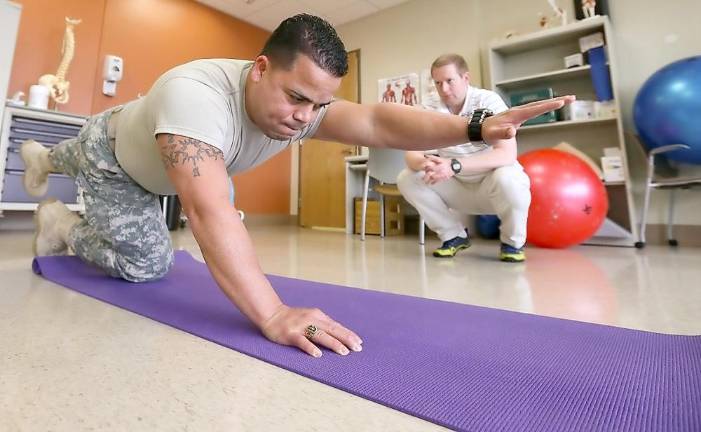Non-drug pain therapies have long-term benefits, study finds
Health. A review veterans' health records found that service members who received non-drug treatments -- such as acupuncture, massage, exercise therapy, and electrical nerve stimulation, among many other alternatives -- were less likely to attempt suicide or develop alcohol or drug use disorders.

A new study based on Veterans Affairs health records finds that non-drug therapies given to military service members with chronic pain may reduce the risk of long-term adverse outcomes, such as alcohol and drug disorders and self-inflicted injuries, including suicide attempts.
The researchers found that service members with chronic pain who received non-drug therapies while in the military, such as massage or acupuncture, had a "significantly lower" risk of new onset alcohol or drug disorder; poisoning with opioids and related narcotics, barbiturates, or sedatives; and suicidal thoughts and attempts.
Dr. Esther Meerwijk, a statistician and suicide researcher at the VA Palo Alto Health Care System in California, was the lead author.
"Chronic pain is associated with adverse outcomes, such as substance use and suicidal thoughts and behavior," Meerwijk says. "It made sense that if non-drug treatments are good at managing pain, their effect would go beyond only pain relief. However, I was surprised that the results of our analyses held, despite our attempts to prove them wrong. Often enough in research, significant results disappear once you start controlling for variables that can possibly affect the outcome of the study."
Meerwijk's team reviewed the VA health records of more than 140,000 Army soldiers who reported chronic pain following their deployment to Iraq or Afghanistan from 2008 to 2014. The most common types of chronic pain involved joints, backs and necks, and muscles or bones.
Chronic pain is often managed with prescription opioids. Especially at higher doses and longer length of use, opioids have been linked to a greater risk of substance use disorder and self-inflicted injuries, such as overdose and suicide attempts.
It's possible, Meerwijk said, that the soldiers who received non-drug therapies didn't have to rely on opioids as much for their chronic pain and are therefore at lower risk for adverse outcomes.
"We may also be seeing a genuine effect of non-drug therapies that occurs regardless of whether soldiers use opioids or not," she said. "If non-drug treatments make chronic pain more bearable, people may be more likely to have positive experiences in life. That makes them less likely to have thoughts of suicide or to turn to drugs."
While in service, the soldiers received non-drug therapies that included acupuncture, dry needling, biofeedback, chiropractic care, massage, exercise therapy, cold laser therapy, osteopathic spinal manipulation, electrical nerve stimulation, ultrasonography, superficial heat treatment, traction, and lumbar supports. Ultrasonography is a technique that uses echoes of ultrasound pulses to pinpoint objects or areas of different density in the body.
A lower risk
The largest difference was seen in accidental poisoning with opioids or other pain drugs: Those who received non-drug therapies were 35 percent less likely to injure themselves than those who didn't receive such therapies while in the service. Service members who received non-drug treatments were also at lower risk down the road for these adverse outcomes:
● Self-inflicted injuries, including suicide attempts: 17 percent less likely.
● Suicidal ideation: 12 percent less likely.
● Alcohol or drug use disorders: 8 percent less likely.
The median age of the cohort was 26, and the median length of deployment was a little more than a year.
Because the study was only observational, based on past treatment data, and didn't include a randomized clinical trial, it doesn't show cause and effect -- only an association.
Another limitation of the study is that the researchers didn't look at specific non-drug therapies to gauge the extent to which they may have contributed -- or not -- to the overall finding.
Other researchers have found that service members who use non-drug therapies may be healthier to start with than those who do not and so may be at lower risk for poor outcomes. But Meerwijk's team did not find that to be the case. They documented that service members who received non-drug treatments in the military were more often hospitalized and had longer inpatient stays, for example, than their peers who had not received such therapies. They were also more likely to be diagnosed with mental disorders, except alcohol use disorder.
"If non-drug treatments make chronic pain more bearable, people may be more likely to have positive experiences in life. That makes them less likely to have thoughts of suicide or to turn to drugs." --Dr. Esther Meerwijk